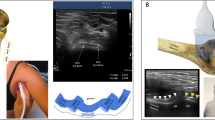Abstract
Objectives
The aim of this retrospective study was to measure the inferior glenohumeral capsule thickness of shoulders clinically affected by capsular contracture by comparison to the contralateral asymptomatic side.
Methods
Bilateral shoulder ultrasound (US) examinations of 20 patients with clinically or MRI proven unilateral capsular contracture were retrospectively assessed. Inferior capsule evaluation was performed with a transducer placed within the axilla in maximally abducted shoulders. Measurements were symmetrically performed orthogonally to the inferior glenohumeral ligament (IGHL) in the axial plane; the coronal plane was used to ensure the tension of the IGHL. The significance of any difference in thickening was assessed with the Mann–Whitney test.
Results
The average thickness was 4.0 mm in shoulders with capsular contracture vs. 1.3 mm in asymptomatic contralateral shoulders (P < 0.0001). Twenty per cent of patients with capsular contracture and inferior capsule thickness increase showed US features of other painful diseases of the rotator cuff.
Conclusion
The thickness of the inferior capsule is measurable through ultrasound examination and appears to be increased in shoulders with capsular contracture. Exploration of the inferior aspect of the shoulder joint could be added to shoulder US examination protocols for capsular contracture assessment even if other rotator cuff abnormalities are diagnosed by US.
Key Points
• Ultrasound is increasingly used to diagnose shoulder problems.
• The thickness of the inferior glenohumeral ligament is measurable in the axilla.
• The inferior glenohumeral ligament appears thickened in shoulders with capsular contracture.
• Capsular contracture ultrasound features can be associated with other rotator cuff problems.




Similar content being viewed by others
References
Hsu JE, Anakwenze OA, Warrender WJ, Abboud JA (2011) Current review of adhesive capsulitis. J Shoulder Elbow Surg 20:502–514
Robinson CM, Seah KT, Chee YH, Hindle P, Murray IR (2012) Frozen shoulder. J Bone Joint Surg Br 94:1–9
Loyd JA, Loyd HM (1983) Adhesive capsulitis of the shoulder: arthrographic diagnosis and treatment. South Med J 76:879–883
Lundberg BJ (1969) The frozen shoulder. Clinical and radiographical observations. The effect of manipulation under general anesthesia. Structure and glycosaminoglycan content of the joint capsule. Local bone metabolism. Acta Orthop Scand Suppl 119:1–59
Emig EW, Schweitzer ME, Karasick D, Lubowitz J (1995) Adhesive capsulitis of the shoulder: MR diagnosis. AJR Am J Roentgenol 164:1457–1459
Sofka CM, Ciavarra GA, Hannafin JA, Cordasco FA, Potter HG (2008) Magnetic resonance imaging of adhesive capsulitis: correlation with clinical staging. HSS J 4:164–169
Ahn KS, Kang CH, Oh YW, Jeong WK (2012) Correlation between magnetic resonance imaging and clinical impairment in patients with adhesive capsulitis. Skeletal Radiol 41:1301–1308
Lee JC, Sykes C, Saifuddin A, Connell D (2005) Adhesive capsulitis: sonographic changes in the rotator cuff interval with arthroscopic correlation. Skeletal Radiol 34:522–527
Homsi C, Bordalo-Rodrigues M, da Silva JJ, Stump XM (2006) Ultrasound in adhesive capsulitis of the shoulder: is assessment of the coracohumeral ligament a valuable diagnostic tool? Skeletal Radiol 35:673–678
Ryu KN, Lee SW, Rhee YG, Lim JH (1993) Adhesive capsulitis of the shoulder joint: usefulness of dynamic sonography. J Ultrasound Med 12:445–449
Kim I, Yi JH, Lee J, Bae JH, Lim JK, Yoon JP, Jeon IH (2012) Limited subacromial gliding of the supraspinatus tendon during dynamic ultrasonography can predict a decrease in capacity and MR arthrographic features of the shoulder joint. Eur Radiol 22:2365–2370
Ticker JB, Flatow EL, Pawluk RJ, Soslowsky LJ, Ratcliffe A, Arnoczky SP, Mow VC, Bigliani LU (2006) The inferior glenohumeral ligament: a correlative investigation. J Shoulder Elbow Surg 15:665–674
Gondim Teixeira PA, Balaj C, Chanson A, Lecocq S, Louis M, Blum A (2012) Adhesive capsulitis of the shoulder: value of inferior glenohumeral ligament signal changes on T2-weighted fat-saturated images. Am J Roentgenol. 198:W589-w596
Mengiardi B, Pfirrmann CWA, Gerber C, Hodler J, Zanetti M (2004) Frozen shoulder: MR arthrographic findings. Radiology 233:486–492
Rodeo SA, Hannafin JA, Tom J, Warren RF, Wickiewicz TL (1997) Immunolocalization of cytokines and their receptors in adhesive capsulitis of the shoulder. J Orthop Res 15:427–436
Bunker TD, Esler CN (1995) Frozen shoulder and lipids. J Bone Joint Surg Br 77:684–686
Bunker TD, Reilly J, Baird KS, Hamblen DL (2000) Expression of growth factors, cytokines and matrix metalloproteinases in frozen shoulder. J Bone Joint Surg Br 82:768–773
Bulgen DY, Binder A, Hazleman BL, Park JR (1982) Immunological studies in frozen shoulder. J Rheumatol 9:893–898
Bunker TD, Anthony PP (1995) The pathology of frozen shoulder. A Dupuytren-like disease. J Bone Joint Surg Br 77:677–683
Ryu JD, Kirpalani PA, Kim JM, Nam KH, Han CW, Han SH (2006) Expression of vascular endothelial growth factor and angiogenesis in the diabetic frozen shoulder. J Shoulder Elbow Surg 15:679–685
Wiley AM (1991) Arthroscopic appearance of frozen shoulder. Arthroscopy 7:138–143
Klauser AS et al (2012) Clinical indications for musculoskeletal ultrasound: a Delphi-based consensus paper of the European Society of Musculoskeletal Radiology. Eur Radiol 22:1140–1148
Edelson JG, Taitz C, Grishkan A (1991) The coracohumeral ligament. Anatomy of a substantial but neglected structure. J Bone Joint Surg Br 73:150–153
Lefevre-Colau MM et al (2005) Magnetic resonance imaging of shoulders with idiopathic adhesive capsulitis: reliability of measures. Eur Radiol 15:2415–2422
Author information
Authors and Affiliations
Corresponding author
Rights and permissions
About this article
Cite this article
Michelin, P., Delarue, Y., Duparc, F. et al. Thickening of the inferior glenohumeral capsule: an ultrasound sign for shoulder capsular contracture. Eur Radiol 23, 2802–2806 (2013). https://doi.org/10.1007/s00330-013-2874-2
Received:
Accepted:
Published:
Issue Date:
DOI: https://doi.org/10.1007/s00330-013-2874-2




